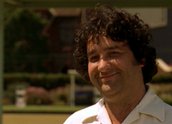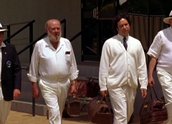


Crackerjack (2002)
Synopsis
Jack Simpson (Mick Molloy), a loud-mouthed slob, discovers a talent for lawn bowls when he’s called on to justify his membership of an inner-city bowls club. He’s been using his three memberships for access to the club’s free carpark, but the club is facing closure, for lack of funds and players. A shifty developer (John Clarke) wants to take over and install poker machines. The club stalwarts – president Len Johnson (Frank Wilson) and ace bowler Stan Coombs (Bill Hunter) – refuse to allow it. They set out to win the local championship, with Simpson as the newest member of the team. Local newspaper reporter Nancy Brown (Judith Lucy) covers the controversy, while resisting Simpson’s efforts to charm the pants off her.
Curator’s notes
Crackerjack won a lot of admirers partly because of the way it combined sentiment and cynicism in roughly equal measure. Molloy’s hard-bitten character – the epitome of a young chancer looking for the quick, easy path through life – has most of his illusions and bad habits shattered by a meaningful encounter with an older, wiser and more daggy generation of Australian men and women, for whom the hard way is usually the right way. One of the key lines in the film is when Bill Hunter, playing a man who has clearly been through at least one war, tells this young joker that he would ‘dig ditches for a living with the right people’ – a concept that’s completely alien to Simpson, who works in a soulless job as a telephone service operator.
The script, by Molloy and his brother Richard, carries a lot of accusations about what’s gone wrong with Australia in the last 30 or so years, but it never becomes preachy, largely because Molloy’s deadpan performance is so completely dominant. The film showed what an accomplished comedian he had become, both in a physical and verbal sense. His body language is a perfect compliment to his used-tyre face; his sense of himself as a Jack-the-lad, even a ladies’ man, just makes his characterisation the more enjoyably ridiculous. There’s also a sense of loneliness about the character that’s never overplayed. His bond with Stan Coombs – the Bill Hunter character – suggests that he needs a father figure. It’s typical of the film that this is usually played out in Stan’s disappointment with his young charge, rather than any sentimental or gushy emotion.
Crackerjack is really the story of how Jack Simpson, an overgrown boy from a spoiled generation, becomes a man through an encounter with the last of the previous generation. That this should happen on a bowling green – a symbolic battlefield of sorts – connects the film to a long tradition in Australian film, in which heroism is usually achieved outdoors, and in male company.
Crackerjack is both a gentle satire on the whole idea of mateship in Australia, and a warm embrace of its gruffer, more unsentimental side. Perhaps it’s also a lament for its passing.
- Overview
- Curator’s notes
- Video 3 clips
- Principal credits
- Find a copy
- Comments 1
- Map
- Add your review



